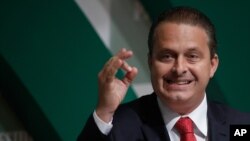The death of presidential candidate Eduardo Campos makes it even more likely Brazil's October election goes to a second round, and could put President Dilma Rousseff under more pressure as she seeks a second term.
Campos died in a plane crash on Wednesday. His running mate Marina Silva is expected to pick up the baton and run for president herself. She is a popular figure who won 19.3 percent of the vote when she ran in 2010.
Silva has greater name recognition and more supporters than Campos had, given that the campaign is still in its early stages. Her candidacy could give his Brazilian Socialist Party a boost and deprive Rousseff of votes she needs to avoid a second-round runoff against her main contender, Senator Aecio Neves.
“The chances of a second round have increased a lot, because Marina Silva will draw more votes away from Rousseff than she will from Aecio Neves,” said David Fleischer, a professor of politics at the University of Brasilia.
However, some observers speculated that a significant surge for Silva could put her ahead of Neves and even knock the pro-business centrist out in the first round of voting.
Silva has 10 days to register as the presidential candidate of Campos' party. She is expected to do so but it is by no means a given.
In the event Silva opts against running for president, Rousseff could win the election outright on Oct. 5, analysts said.
In a runoff between Rousseff and Neves, Fleischer said more of Silva's supporters would vote for Neves. Even though they might not like his PSDB party, “they like Rousseff even less.”
Brazil's financial markets were thrown into turmoil on Wednesday as some investors sold stocks on fears that Silva could edge out Neves, who has promised more market-friendly policies.
Neves has drawn closer to Rousseff in recent weeks but his campaign has so far failed to capitalize on a widespread desire for change among discontented Brazilians that is reflected in Rousseff's high rejection numbers.
A Silva candidacy “would make the election much more competitive,” said Joao Augusto de Castro Neves, of the political risk consultancy Eurasia. “It would make the election more difficult for Neves as both Neves and Silva have chances to go to a run-off vote.”
In a brief news conference with PSB party leaders, a grief-stricken Silva expressed condolences to Campos' family but made no mention of her political plans.
The daughter of illiterate rubber-tappers, Silva grew up in the rainforest, learned to read as a teenager, made it to university and became Brazil's youngest senator at age 36. In the 2010 presidential election, she ran on an environmental platform and came third with 19.6 million votes.
An evangelical with a feisty campaign style, Silva is an unconventional figure in Brazilian politics. Her conservationist advocacy has earned the wrath of Brazil's powerful agribusiness sector, yet Silva can appeal to conservative voters with her defense of family values and opposition to abortion.
A poll last week showed Neves has 23 percent of voter support behind 38 percent for Rousseff. The IBOPE poll showed Neves had narrowed Rousseff's lead in a likely second-round runoff to just six points.
But if Silva decides not to step into Campos' shoes, Rousseff stands to gain most, said political scientist Claudio Couto of the Getulio Vargas Foundation think tank.
“If she does not run, the chances increase that the election will be decided in the first round,” Couto said.









